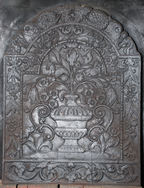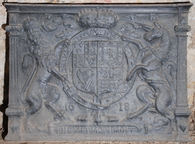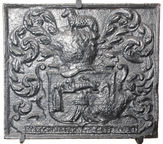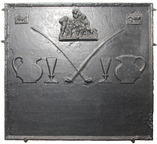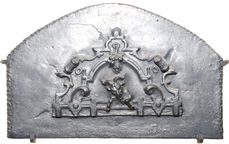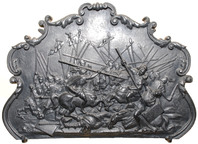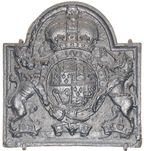-
516
Description: Arched rectangular central panel with bead-and-pellet edging; on a ground between two plants, a gadrooned flower vase with two, scrolled handles, tulips and other flowers issuing from the narrow neck; arched rectangular border with fillet edging; mirrored descending flower swags; along a rectangular bottom panel with fillet edging a symmetrical arrangement of swirled foliage; on top, two mirrored sea serpents.
Notes: The presence of tulips suggest a Dutch origin for the pattern of this fireback, although the presence of several examples in England suggest that it was produced here rather than on the Continent.
Copies of this fireback are known.
- Decoration tags:
- 'Dutch' (shape)
- fillet (edging)
- whole carved pattern
- planklines
- pictorial
- plants
- objects
Manufactured: in the late-17th century in England.
Current location: Penshurst Place, Penshurst, Kent, England.
- Attached to series:
- Flower Vase 'Dutch' types
- British 'Dutch' style firebacks
-
517
Description: Rectangular; ogee within broad fillet moulded edging; top centre, date between split initials, with small diamonds between date and initials and outside initials.
Inscription: T 1665 S
- Decoration tags:
- rectangular (shape)
- fillet and ogee (edging)
- text
Manufactured: in 1665 in the Weald area of England.
Current location: Penshurst Place, Penshurst, Kent, England.
- Attached to series:
- Date & initials firebacks
-
519
Description: Rectangular; Ionic pilasters at sides, architrave on top; English Stuart royal shield, garter, crown, motto and supporters; date below and either side of garter.
Notes: One of several firebacks, all of the same date, but varying in size, framing style and moulding; all have stylistic features in common and will have been the work of the same pattern maker, who was also responsible for carving royal coats of arms in three West Country churches. A plaster cast of a fireback of this design is displayed as the royal arms in St George's church, near Abergele in north Wales. Copies of this fireback were advertised in Bratt Colbran Ltd.'s (London) catalogue in the early-20th century.
Copies of this fireback are known.
Inscription: HONI SOIT QVI MAL Y PENSE / 16 18 / DIEV ET MON DROIT
Arms: English Stuart royal (James I)
- Decoration tags:
- rectangular (shape)
- complex individual (edging)
- whole carved pattern
- armorial
- royal
- text
Manufactured: in 1618 possibly in the Forest of Dean area of England.
Current location: Penshurst Place, Penshurst, Kent, England.
-
546
Description: Rectangular; ovolo edging; shield, helm, crest, mantling and motto of the Merchant Taylors’ Company: Argent a Pavilion Imperial Purple garnished Or lined Ermine between two Mantles also Imperial Purple lined Ermine on a chief Azure a Lion passant guardant Or.
Notes: Arms were re-granted to the Company in 1586; the excrescences on the helm and shield are probably the result of splashes caused when pouring the iron into the mould from too great a height. Mitford collection, Petworth House.
Inscription: CONCORDIA PARVAE RES CRESCUNT [In Harmony Small Things Grow]
Arms: Worshipful Company of Merchant Taylors
- Decoration tags:
- rectangular (shape)
- ovolo (edging)
- whole carved pattern
- armorial
- text
Manufactured: in the late-16th to early-17th century possibly in the Weald area of England.
Current location: Petworth House, Petworth, West Sussex, England.
Museum number: NT/PET/M/101 (part of the National Trust museum group)
- Attached to series:
- Livery company firebacks
-
548
Description: Arched rectangular central panel with bead edging; female figure, a crown above her head, holding two snakes; arched rectangular border with fillet edging; top centre, knot of ribbon with festoons of pomegranates suspended therefrom via a ring on each shoulder of the plate; at the bottom, two crossed palm fronds; on top, symmetrical arrangements of swirled foliage; on each side, a plain rectangular panel with fillet edging.
Notes: Possibly the allegorical figure of Democracy; the form of the palm fronds and the swirled foliage on top suggest a common pattern-maker with the TAN series and the Mayfield 'Dutch' series. Mitford collection, Petworth House.
- Decoration tags:
- 'Dutch' (shape)
- fillet (edging)
- whole carved pattern
- extension panels
- pictorial
- allegorical
- humans
Manufactured: in the early-18th century in England.
Current location: Petworth House, Petworth, West Sussex, England.
Museum number: NT/PET/M/102 (part of the National Trust museum group)
- Attached to series:
- British 'Dutch' style firebacks
- TAN series
-
551
Description: Rectangular; ovolo-moulded edging; top centre, stamp formed of a carved domestic scene of a family around a table, between two small mirrored rectangular stamps each of a cow; lower centre, symmetrical arrangement of two jugs, two goblets and two crossed churchwarden pipes, all in low relief.
Notes: The domestic group has been formed from a decorative iron mantelpiece ornament portraying the tale of the goose that laid golden eggs. Having killed the goose, the family are lamenting the loss of their bounty (see Ames, 1980, p.94). The style of the fireback suggests a pastiche using designs suggesting the past. The same mantelpiece group can be seen as decoration on the kitchen spit assemblage at Petworth House, West Sussex, which was cast at Robert Chorley's foundry at Cocking, south of Midhurst. Evidently this and another fireback bearing the same ornament stamp were among items from the Cowdray estate sold in 1898. Mitford collection, Petworth House.
- Decoration tags:
- rectangular (shape)
- ovolo (edging)
- carved stamps
- animals
- humans
- objects
Manufactured: in the early-19th century probably at Cocking Foundry in the Weald area of England.
Current location: Petworth House, Petworth, West Sussex, England.
Museum number: NT/PET/M/43 (part of the National Trust museum group)
Citation: Ames, A., 1980, Collecting Cast Iron (Ashbourne, Moorland Publishing).
- Attached to series:
- Cocking foundry firebacks
- Ornament stamp firebacks
- Metalware stamp firebacks
-
558
Description: Arched rectangular shape; fillet edging; top centre, stamp formed of a carved domestic scene of a family around a table; in top corners, repeated small stamp of St George and the Dragon; below, repeated stamp of a pineapple in a pot; centre; small stamp of the royal arms of the United Kingdom 1801-37.
Notes: The domestic group has been formed from a decorative iron mantelpiece ornament portraying the tale of the goose that laid golden eggs. Having killed the goose, the family are lamenting the loss of their bounty (see Ames, 1980, p.94). The same mantelpiece group and pineapple stamp can be seen as decoration on the kitchen spit assemblage at Petworth House, West Sussex, which was cast at Robert Chorley's foundry at Cocking, south of Midhurst. Evidently this and another fireback bearing the same ornament stamp were among items from the Cowdray estate sold in 1898. Mitford collection, Petworth House.
Arms: Royal arms of the United Kingdom 1801-37
- Decoration tags:
- rectangular with round arch (shape)
- fillet (edging)
- carved stamps
- armorial
- royal
- animals
- humans
- plants
Manufactured: in the early-19th century probably at Cocking Foundry in the Weald area of England.
Current location: Petworth House, Petworth, West Sussex, England.
Museum number: NT/PET/M/50 (part of the National Trust museum group)
Citation: Ames, A., 1980, Collecting Cast Iron (Ashbourne, Moorland Publishing).
- Attached to series:
- Cocking foundry firebacks
- Ornament stamp firebacks
- Metalware stamp firebacks
-
559
Description: Arched rectangle with crude scalloping around the edges; elaborate, symmetrical strapwork frame with scrolls top left and right, and below, a bunch of grapes hanging from the top, and the head and forelegs of a goat climbing through; inside each upper scroll, a small astragel edged oval.
Notes: This strap-work stamp, characteristic of late-16th and early-17th century architectural drawings and engravings and derivative of the work of artists like Hans Vredeman de Vries, was probably derived from interior carving on a fireplace overmantel or similar. The goat and bunch of grapes suggest an allusion to Bacchus. Marks round the edge of this fireback suggest that it may have been reduced from a larger size. Mitford collection, Petworth House.
- Decoration tags:
- rounded arched (shape)
- scalloped (edging)
- simple stamps
- architectural
- animals
- plants
- objects
Manufactured: in the late-16th to early-17th century possibly in the Weald area of England.
Current location: Petworth House, Petworth, West Sussex, England.
Museum number: NT/PET/M/53 (part of the National Trust museum group)
- Attached to series:
- Miscellaneous stamp firebacks
-
560
Description: Quasi-arched rectangular shape with symmetrical double fillet rococo edging; high relief pictorial battle scene with mounted knights carrying lances and pennants.
Notes: The battle scene may have been inspired by more than one classical portayal of a battle in history; likely sources are 'The Defeat of the Pisans at the Tower of St Vicenzo' by Giorgio Vasari and 'Alexander the Great's crossing of the Granicus' by Charles Le Brun. An engraving by Daniel Kellerthaler (1574-1648) has a similar frame enclosing an unidentified cavalry conflict. Mitford collection, Petworth House. Copies of this fireback were advertised in Burton Weir's (Rotherham) catalogue in the early-20th century.
Copies of this fireback are known.
- Decoration tags:
- baroque (shape)
- complex individual (edging)
- whole carved pattern
- pictorial
- humans
Manufactured: in the late-18th to early-19th century in England.
Current location: Petworth House, Petworth, West Sussex, England.
Museum number: NT/PET/M/54 (part of the National Trust museum group)
- Attached to series:
- Miscellaneous pattern firebacks
-
563
Description: Arched rectangular shape; cavetto edging; Stuart royal arms of England (quarterly, 1st and 4th, France and England, 2nd Scotland and 3rd Ireland) with garter, crown, motto and supporters; initials either side of crown base.
Notes: As in others of this series the design overlaps the edging. Mitford collection, Petworth House. Copies were advertised in Longden & Co.'s (Sheffield) catalogue c.1911, and inferior copies in Kings Worthy Foundry's (Winchester) catalogue in the mid-20th century.
Copies of this fireback are known.
Inscription: C R / ...SOIT QVI MAL Y ...
Arms: English Stuart royal
- Decoration tags:
- rectangular with round arch (shape)
- cavetto (edging)
- whole carved pattern
- armorial
- royal
- text
Manufactured: in the mid- to late-17th century in the Weald area of England.
Current location: Petworth House, Petworth, West Sussex, England.
Museum number: NT/PET/M/57 (part of the National Trust museum group)
